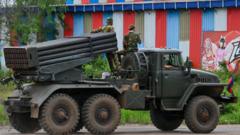Trump's revised 10-12 day timeline emphasizes growing frustration over ongoing conflict in Ukraine.
**Trump Sets Urgent Deadline for Russia to Agree on Ukraine Ceasefire**

**Trump Sets Urgent Deadline for Russia to Agree on Ukraine Ceasefire**
Former US President urges immediate action as hopes for peace negotiations dwindle.
In a surprising development, former President Donald Trump has proposed a new timeline for Russia to agree to a ceasefire in Ukraine, stating that a resolution should be reached within "ten or 12 days" starting from Monday. During a press conference in Scotland, Trump highlighted the necessity for immediate action, expressing his disappointment with President Putin's ongoing aggression and the lack of progress towards peace.
Ukrainian President Volodymr Zelensky termed Trump's intervention as "extremely significant", appreciating the urgency attached to the new deadline. Previously, Trump had previously issued a 50-day ultimatum for ending the conflict, coupled with threats of severe tariffs on any country trading with Russia. If enacted, these tariffs could impose a 100% tax on goods, forcing U.S. businesses to seek alternatives and significantly affecting Russia's economy.
Following discussions with UK Prime Minister Keir Starmer, Trump reiterated his critique of the Russian President's handling of the war that has persisted for over three years. While he refrained from directly accusing Putin of deceit, he underscored the contradiction between their private discussions and Russia's continued missile strikes on Ukrainian cities. Trump stated, "We were going to have a ceasefire… and all of a sudden you have missiles flying into Kyiv," expressing his frustration over the refusal to engage in meaningful negotiations.
This latest deadline proposal has drawn mixed responses. Russian MP Andrey Gurulyov stated that Trump's ultimatums are ineffective, asserting that Russia remains strong and resolute in its military efforts. Meanwhile, Ukrainian officials, including presidential chief of staff Andriy Yermak, lauded Trump's assertive message as reflecting the need for strength in diplomatic discussions.
Despite several rounds of negotiations mediated by Turkey, no substantial ceasefire agreement has been achieved, and the conditions laid down by Russia remain unacceptable to Ukraine and its allies. As both sides prepare for continuing confrontations, the prospect of achieving a ceasefire within Trump's proposed timeframe appears increasingly grim. With escalating attacks from Russia and a steadfast refusal to abandon its military ambitions, the future of peace negotiations remains uncertain.
Ukrainian President Volodymr Zelensky termed Trump's intervention as "extremely significant", appreciating the urgency attached to the new deadline. Previously, Trump had previously issued a 50-day ultimatum for ending the conflict, coupled with threats of severe tariffs on any country trading with Russia. If enacted, these tariffs could impose a 100% tax on goods, forcing U.S. businesses to seek alternatives and significantly affecting Russia's economy.
Following discussions with UK Prime Minister Keir Starmer, Trump reiterated his critique of the Russian President's handling of the war that has persisted for over three years. While he refrained from directly accusing Putin of deceit, he underscored the contradiction between their private discussions and Russia's continued missile strikes on Ukrainian cities. Trump stated, "We were going to have a ceasefire… and all of a sudden you have missiles flying into Kyiv," expressing his frustration over the refusal to engage in meaningful negotiations.
This latest deadline proposal has drawn mixed responses. Russian MP Andrey Gurulyov stated that Trump's ultimatums are ineffective, asserting that Russia remains strong and resolute in its military efforts. Meanwhile, Ukrainian officials, including presidential chief of staff Andriy Yermak, lauded Trump's assertive message as reflecting the need for strength in diplomatic discussions.
Despite several rounds of negotiations mediated by Turkey, no substantial ceasefire agreement has been achieved, and the conditions laid down by Russia remain unacceptable to Ukraine and its allies. As both sides prepare for continuing confrontations, the prospect of achieving a ceasefire within Trump's proposed timeframe appears increasingly grim. With escalating attacks from Russia and a steadfast refusal to abandon its military ambitions, the future of peace negotiations remains uncertain.



















